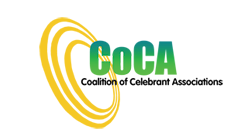Marriage Law and Celebrant Section
Attorney-General’s Department
Canberra ACT 2600
Friday 6th October 2016
Dear Rohan
As discussed at the last Stakeholders Meeting and yesterday, it would be helpful for our profession to have more information upon which to plan training, professional development and other services for celebrants.
There may be other ways to collect some information for improving the Marriage Celebrant Program and assisting Workforce development needs (e.g. an entry survey, exit survey as well as the annual survey) at the same time.
It would also be beneficial for the AGD to compile a statistical fact sheet each financial year summarising this data (Items 1 to 11) and publish this on the AGD website for the information of all celebrants. If possible, retrospective comparative data would be very useful to show changing trends. If not, CoCA may be able to assist by searching our records of previous meetings with the Department for some of those figures.
In particular, the Coalition of Celebrant associations would like to know how representative our survey sample of the Commonwealth marriage celebrant population is. To assist the following would be helpful:
1. Statistics currently provided by the Department.
CoCA appreciates and recommends that the following statistics continue as previously supplied:
1. Registrations
2. Applications for registration
3. Number of new registrations – and type (civil/ religious)
4. Application fee exemptions
5. De-registrations – and reason
6. Number of Exemptions from the annual fee
7. Incoming correspondence
8. OPD compliance
9. OPD exemptions
10. Complaints – by type (Statutory/ Non-statutory)
Statutory complaints relate to the solemnisation of a marriage; non-statutory complaints relate to any other matter raised about a celebrant
11. Complaints – by description for both types.
The following additional information would make the statistics more meaningful:
Item 1: Registrations
Add type of celebrant (civil/ religious/ both) at comparative date (e.g. 1st July each year)
Add gender (male, female, no sex, intersex)
Add by age: 18 to 29; 30 to 39; 40 to 49; 50 to 59; 60 to 69; 70 to 75; 76 or older
Add number of Commonwealth Marriage Celebrants by states and territories
Add number of Commonwealth Marriage Celebrants by date of appointment - 1973 to 1984; 1985 to 1994; 1995 to 2002; 2003 to June 2010; July 2010 to June 2014; July 2014 to now
Add Highest Education Qualification gained – SC, HSC, Cert IV, VET Dip., VET Advanced Dip., Degree, Gradate Dip. Masters, Phd.
Item 2: Applications for registration
add gender, type of celebrant (civil/ religious)
Item 3: Number new registrations
add gender, type of celebrant (civil/ religious)
Item 5: Reasons for de-registration – and reasons
The Form used by the department needs to collect information to assist with future planning.
1. Gender
2. Highest Education Qualification gained
3. Year of Authorisation
4. Year of De-registration
5. Age at De-registration
6. Reason for Resignation/ De-registration
- Death
- De-registration due to age
- De-registration due to health and/or disability
- Not proceeding due to
- costs of maintaining authorisation
- lack of work
- other
- Death
- De-registration due to age
- De-registration due to health and/or disability
- Not proceeding due to
- costs of maintaining authorisation
- lack of work
- other
7. Did your training adequately prepare you to establish an independent celebrancy business?
8. Did your ongoing professional development assist you in developing your celebrancy career?
9. Any recommendations to improve the Marriage Celebrant Program?
Item 7: Incoming correspondence
Add inquirer type – public, state/territory celebrant, Commonwealth celebrant
Add type of inquiry – about becoming a celebrant, about the program (e.g. opd, fees), legal information, other information or however they are grouped in your records.
2. Statistics from the Annual Return
At the last stakeholders meeting there was mention of an annual survey in January. There were nine questions on our survey that would be useful from a workforce development perspective to compare with a survey of all Commonwealth Marriage Celebrants.
Question 1: Are you currently a financial member of a celebrant association?
Responses:
- yes
- no - however I am a member of a celebrant association that does not charge fees
- no
- don't know
Responses:
- not applicable
- don’t know what they do
- don’t do enough ceremonies to pay for the fees
- too busy to receive their support
- got all I need from my training
Responses:
- · one
- · two
- · three
- · more than three
Responses:
- yes
- · no
- · don't know
- · other
Responses:
- yes
- no
- don't know
Responses:
- not applicable
- individual
- group
- don't know whether my cover is individual or group
Responses:
1 to 9; 10 to 19; 20 to 35; 36 to 49; 50 to 75; 76 to 100; over 100
Question 8: Is celebrancy a major source of your income?
Responses:
- Yes
- No
- A basic wedding with only the legals included
- A personalised wedding using common readings and rituals
- A, one off unique ceremony, with original text, rituals, choreography etc.
Day-time Saturday BDM fees $507 NSW; $490 Victoria; $400 Queensland; $280 SA; $240 NT. ACT and Tasmania do not provide marriage ceremonies and WA only provides mid-week weddings @ $355.
Responses:
- · I do not charge for weddings
- · less than the registry fee
- · about same as the registry fee
- · about $100 – $250 more than the registry fee
- · about $250 - $500 more than the registry fee
- · about $500 or more than the registry fee
The following questions were used as part of the CoCA Survey. It would be appreciated if these could be incorporated into the Annual Return Survey and, if the Department is planning a survey on ongoing professional development in association with its review of the OPD, then such a mechanism may also be useful.
Question 1: In regards to ongoing professional development for Commonwealth marriage celebrants, how would you rank the OPD options available through the current approved OPD program in relation to these 4 areas?
- · access to what I consider my priority needs
- · access to the latest trends in marriage and other ceremonies
- · ability to strengthen existing skills
- · ability to learn new skills
- · not available
- · excellent
- · good
- · satisfactory
- · poor
- · don’t know
Responses:
- · funerals
- · memorials
- · interment//scattering of ashes
- · divorce or new beginnings
- · namings
- · coming of adolescence and coming of age
- · birthdays
- · ceremonies for seniors e.g. retirement, eldering
- · wedding anniversaries
- · marriage vow renewals
- · commitments
- · same sex unions
- · ceremonies for the LGBTIQ
- · none of the above
Responses:
- · planning a ceremony for any occasion
- · building client rapport
- · networking
- · marketing analysis
- · small business planning and evaluation
- · social media
- · performing as Master of Ceremonies
- · creative writing
- · research
- · organisation and management
- · application of psychological, social and cultural knowledge to ceremonies
- · celebrant presentation and performance skills
- · IT and computer technology
Responses:
- · yes
- · no
- · don't know
Responses:
- · yes
- · no
- · don't know
Conclusion:
We would be very pleased to dialogue further with the Department about this matter.
Kind regards
Rona Goold
CoCA Secretary
Coalition of Celebrant Associations (CoCA) Inc.
This email address is being protected from spambots. You need JavaScript enabled to view it.
PHONE: 02 4885 2393 - best
MOBILE: 0419 498 768


